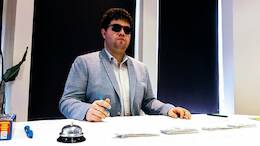Toolbox — For Training and Youth Work
All new tools in your inbox: Be the first to know about new tools for learning with our e-mail notifications.
Simulation Exercise
Euro Casino
Euro Casino is a non-formal education method, useful for youth workers to sum up and evaluate a workshop / training course / youth exchange etc, as well as for youths and adults to assess their own learning process.
Aims of the tool
It is a teamwork game, which makes it a great tool to foster dialogue and increase interpersonal competences, to develop leadership skills and assume responsibilities in a fun, yet serious way. It is also a strategy game, which allows participants to explore ways of setting and achieving a common goal within a team, take risks and learn from mistakes. Moreover, the large scale of possibilities to evaluate knowledge, skills and attitudes achieved during one specific programme (by challenging participants with specific related tasks) makes it a good option for any final non-formal evaluation activity.
Description of the tool
It consists of a simulation of a real casino, where each table brings new challenges for the participants. Depending on the nature of the programme we want to evaluate, the casino can have a very diverse range of tables (stocks, questions and gambling, psychomotrical challenges, memory or board games, etc.). Each team (4-6 people) has an equal amount of credits to start with and 2 minutes to set up a strategy. The tables with challenges get opened one by one, starting with the safest options. After 30 minutes, all tables are opened. To take a challenge they have to pay. Each facilitator at the table can choose its own strategy (they can change price, make special offers, accept to negotiate if asked etc.) and advertise the challenge like in a real casino. The team which has biggest amount of credits in the end wins.
Suggestions
- Make sure you have enough facilitators to share the roles. During the game you will need at least 1 person/table. You can also use one person to sell drinks or Internet connection, one to take the unattended credits and drop credits on the floor to see what others do. Also, if you want to record this on camera, do not count on table facilitators or participants, once they are in the game they will forget to press play (set up the camera on Auto or have someone there just for this).
- Make sure you have enough time to prepare the setting. Play casino music, use colour lights, balloons, dress formally, give tickets at the entrance. Be creative!
- Being a very intense experience, prepare the debriefing really well.
- Make the challenges relevant for your project. For example, if your project is an Erasmus+ Youth Exchange about Entrepreneurship, the Question table can have: questions regarding the topic of the project (info found out during the sessions), general questions about different cultural aspects of the countries represented in the project (experienced during intercultural night) or the European Union and Erasmus+ programme and also Monopoly-like challenges (lose/win credits, take another question, go to another table with challenges, etc.).
Available downloads:
Disclaimer
SALTO cannot be held responsible for the inappropriate use of these training tools. Always adapt training tools to your aims, context, target group and to your own skills! These tools have been used in a variety of formats and situations. Please notify SALTO should you know about the origin of or copyright on this tool.
Tool overview

http://toolbox.salto-youth.net/2216
This tool is for
In can be used for groups of 16 to 40 people, young people, youth leaders and youth workers.
and addresses
Group Dynamics, Youth Initiatives, Organisational Management, Youth Participation
It is recommended for use in:
Youth Exchanges
Training and Networking
Materials needed:
- fake money (credits)
- stocks (open questions on A4 papers for the participants)
- minimum 3 facilitators;
- closed questions (to be put in the balloons);
- some gambling games (cards, dices, darts etc)
Duration:
The method usually takes 90 min. to play + 35 min. for debriefing.
Behind the tool
The tool was created by
GEYC Team, Gabriel Brezoiu and Diana Ionita (Romania)
in the context of
The tool was initiated and then refined through several youth mobility projects (training courses and youth exchanges)
The tool was published to the Toolbox by
Gabriel Brezoiu (on 8 April 2018)
and last modified
17 January 2018
Comments
No comments have been posted yet.
If you want to comment on this tool, you need to be signed in with your MySALTO account. Sign in now